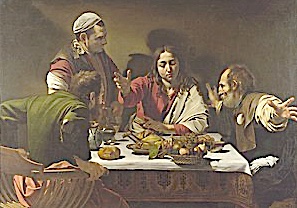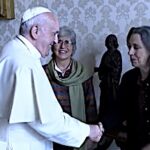Illustration: Supper at Emmaus by Caravaggio, 1601
Pope Francis address to young priests and monks of the oriental orthodox churches
23 February 2023
“unity is pilgrimage; unity is dialogue; unity is desire”.
13 That very day two of them were going to a village named Emma′us, about seven miles[a] from Jerusalem, 14 and talking with each other about all these things that had happened. 15 While they were talking and discussing together, Jesus himself drew near and went with them. 16 But their eyes were kept from recognizing him. 17 And he said to them, “What is this conversation which you are holding with each other as you walk?” And they stood still, looking sad. 18 Then one of them, named Cle′opas, answered him, “Are you the only visitor to Jerusalem who does not know the things that have happened there in these days?” 19 And he said to them, “What things?” And they said to him, “Concerning Jesus of Nazareth, who was a prophet mighty in deed and word before God and all the people, 20 and how our chief priests and rulers delivered him up to be condemned to death, and crucified him. 21 But we had hoped that he was the one to redeem Israel. Yes, and besides all this, it is now the third day since this happened. 22 Moreover, some women of our company amazed us. They were at the tomb early in the morning 23 and did not find his body; and they came back saying that they had even seen a vision of angels, who said that he was alive. 24 Some of those who were with us went to the tomb, and found it just as the women had said; but him they did not see.” 25 And he said to them, “O foolish men, and slow of heart to believe all that the prophets have spoken! 26 Was it not necessary that the Christ should suffer these things and enter into his glory?” 27 And beginning with Moses and all the prophets, he interpreted to them in all the scriptures the things concerning himself. 28 So they drew near to the village to which they were going. He appeared to be going further, 29 but they constrained him, saying, “Stay with us, for it is toward evening and the day is now far spent.” So he went in to stay with them. 30 When he was at table with them, he took the bread and blessed, and broke it, and gave it to them. 31 And their eyes were opened and they recognized him; and he vanished out of their sight. 32 They said to each other, “Did not our hearts burn within us while he talked to us on the road, while he opened to us the scriptures?” 33 And they rose that same hour and returned to Jerusalem; and they found the eleven gathered together and those who were with them, 34 who said, “The Lord has risen indeed, and has appeared to Simon!” 35 Then they told what had happened on the road, and how he was known to them in the breaking of the bread. (Luke 24:13-35)
Dear brothers,
I greet you with joy in the Lord. I am pleased to receive you for the third edition of this fine initiative that enables young priests and monks of the Oriental Orthodox Churches to visit Rome.
This year you have come at the beginning of Lent, a journey that Christians undertake in preparation for the Paschal Mystery of Christ, the heart of our faith.
I am thinking of another journey that two disciples made together with the Risen Lord on the very day of Easter (cf. Lk 24:13-35).
This journey to Emmaus can in some way symbolize the ecumenical journey of Christians towards full communion. I see certain elements common to these two journeys, three of which I would like to share with you today.
1 Unity is Pilgrimage
The first is that, if Christians walk together, like the two disciples of Emmaus, they will be joined by Christ. He will accompany, inspire and bring to completion their journey. Along the way, Jesus approached the two disciples, who were distraught and bewildered. Unrecognized, he walked beside them and shared in their journey, which then became a pilgrimage. Their sorrow and distress prevented them from recognizing him (cf. v. 16); and in a similar way, discouragement and self-concern can prevent Christians of different confessions from seeing what unites them, from recognizing Christ who unites them.
So, as believers, we need to trust that the more we walk together, the more we will be mysteriously accompanied by Christ, for unity is a shared pilgrimage.
2 Unity is Dialogue
The Evangelist tells us that those two disciples were “talking with one another about all the things that had happened” (vv. 14-15). Here is the second element, which is dialogue: the dialogue of charity, the dialogue of truth and the dialogue of life, the three dimensions indicated by the Ecumenical Vademecum issued by the Dicastery for Promoting Christian Unity. Dialogue between the pilgrims of Emmaus led to dialogue with Jesus, who became its “exegete”; interpreting their discussions, Christ spoke to their hearts, gave them hope and set them afire as he explained in the Scriptures all the things that referred to him (cf. v. 27). Here we can see how dialogue between Christians has to be grounded in the word of God, which the Lord Jesus makes us understand by the light of his Spirit.
3 Unity is Desire
To journey together as pilgrims and to dialogue; we now come to the third element.
The Evangelist tells us that when the disciples drew near to Emmaus, Jesus “walked ahead as if he were going on” (v. 28). The Lord did not impose his presence, the disciples begged him to remain: “Stay with us, because it is almost evening and the day is now nearly over” (v. 29). They wanted to be together with Christ.
They did not go off, each to his own home, but desired to prolong their fellowship with Jesus and with one another. They urged him; they kept insisting. This is the third element: we need to desire unity with prayer, with all our heart and strength, insistently and tirelessly. For if the desire for unity fades, it is not enough to pursue dialogue: everything turns into a formality, into something expected. If, on the other hand, we desire to open the doors to Christ together with our brothers and sisters, everything changes.
Scripture tells us Jesus did not break bread with disciples who were defeatists and divided; they had to invite him in, to welcome him, to desire him together. This is perhaps what is today most lacking to Christians of different confessions: an ardent desire for unity, which can prevail over partisan interests.
Dear brothers, unity is pilgrimage; unity is dialogue; unity is desire.
If we experience these three dimensions on the journey of ecumenism, then, like those disciples, we will come, together, to recognize Jesus in the breaking of the bread and benefit from fellowship with him at the same Eucharistic table (cf. vv. 30-31).
And like the two disciples of Emmaus who raced back to Jerusalem to tell the others with joy and amazement what they had experienced, we too will be able to bear credible witness to the crucified and risen Lord, “so that the world may believe” (Jn 17:21).
Dear brothers, you undertook a journey to come here. I thank you for this. During this, your pilgrimage to Rome, I hope that you will experience the living presence of the risen Lord, so that our communion may increase in fraternal dialogue, and that a fervent desire for unity may be renewed in each of you.
May the Lord bless you and the Mother of God watch over you. I ask you kindly to convey my greetings to your Bishops and to your Churches. One of you comes from deeply afflicted Syria; I would like to express a particular closeness to that dear people, sorely tried not only by war but also by the earthquake that, as in Turkey, has caused so many deaths and terrible devastation. Before the suffering of so many innocent people, children, women, mothers and families, I express my prayerful hope that everything possible will be done for every person, without motivations or sanctions that prevent the provision of urgent and necessary assistance to the population.
Dear brothers, I thank you and I assure you of my prayers. I ask you, please, not to forget me when you speak to the Lord. If it is agreeable to you, we can now pray together, each in his own language, the Our Father.

